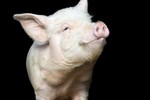
Now, governments are concerned that pig farmers around the world are selling their herds because they cannot afford to feed their pigs.
To help keep pig farmers in business, the US has implemented a special pork-buying programme for consumers. British shoppers are being urged to make a special effort to safeguard supplies of bacon and pork by only buying packs with the special Red Tractor logo. And the Chinese government is putting pork into cold storage to buffer the higher prices predicted for next year.
A meeting of European Union pig industry leaders recently took place in London as a way to explore the means of ensuring pork’s status as one of the world’s most affordable meats while raising prices enough to cover costs. However, an outcome from the meeting showed that supermarkets were not raising the price of pork fast enough, which was causing farmers to sell their pig herds as the record price of feed outweighed profit.
Urgent need for price rise
NPA chairman Richard Longthorp explained it usually takes six months for higher production costs to work their way through to shop prices. He said: “Pig farmers simply haven’t got that long. Some have only got a few weeks left before they run out of credit at the bank and have to sell up and this is happening all over Europe.”
The urgent need for the price of pork to go up isn’t only being felt in the UK and Longthorp explained it was “urgent” that the retail price went up by a “modest”amount to keep pig farmers in business. However, the industry wants the meat to remain affordable, as it is currently half the price of beef and lamb.
Longthorp said: “Some forecasters believe the price will increase by over a third eventually. But we would rather see a more immediate, modest but sustainable rise that would allow producers to get into profit sooner thereby preventing the wholesale reduction in the pig herd with the inevitable record prices that would follow.”





